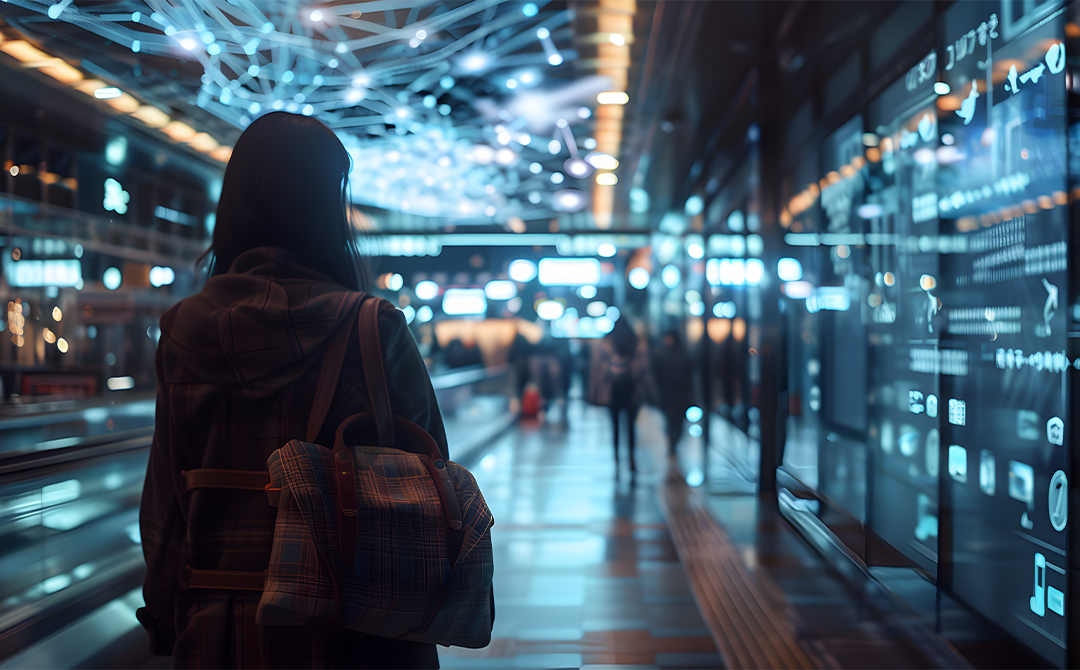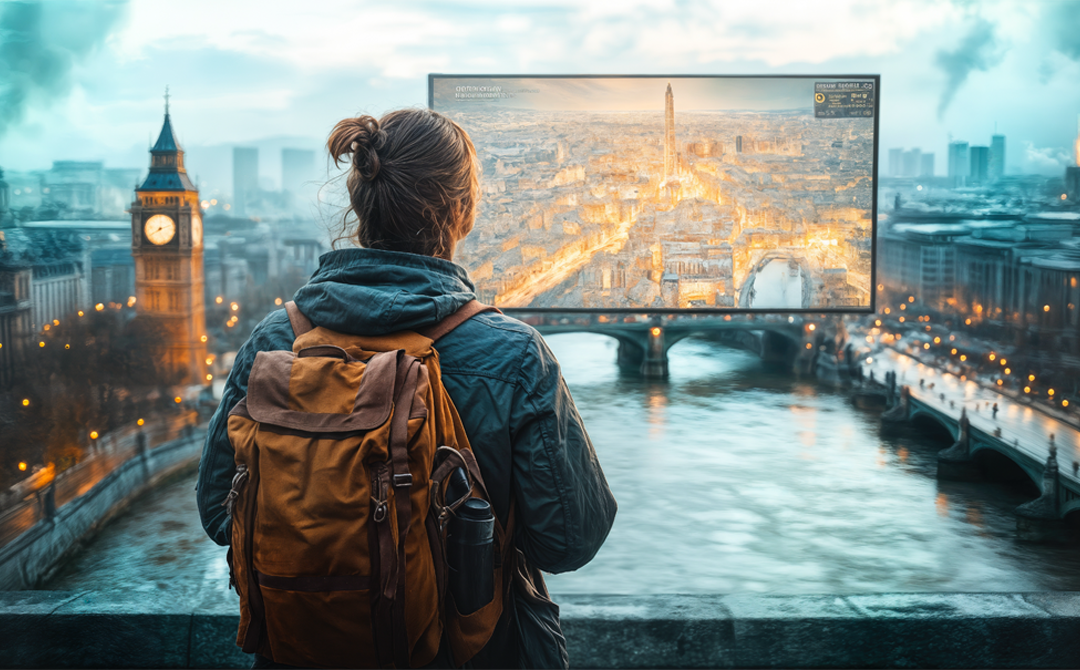
Travel used to be simple: pick a destination, book a hotel, maybe plan a few sights. But today, when you think of planning a trip, what springs to mind? Hours scrolling through booking sites. Reworking itineraries at the last minute because something changed. That’s because people want more: trips that feel made for them, their tastes, pace, budget, even their mood. What if there was a way for travel to feel more like talking with a friend who knows you well, than wrestling with impersonal search boxes?
That’s where Generative AI agents in travel come in. These are AI assistants) that can generate suggestions, content, itineraries, or even handle booking flows, not just based on fixed rules but adapted to your preferences, context, constraints, and sometimes even mood or sustainability goals. Let’s talk about what AI travel planners are, how GenAI agents are transforming travel & hotel booking, what is working (and what isn’t), and what the future likely holds.
What is an AI Travel Planner?
Definitely not a chatbot! It is a smart travel companion, meaning a system (often conversational software) that helps a user plan a trip with minimal friction. It is a tool that helps you decide where to go, what to do, where to stay. But at its more ambitious end, an AI travel planner is something that is:
- Autonomous: it can take multiple steps to complete a goal (research, compare, book).
- Context-aware: Asking about preferences (e.g., budget, interests, pace, travel style, lodging type). It then remembers preferences, loyalty status, past trips and aligns it with real-time data (flight/hotel prices, availability, weather, events)
- Actionable: It recommends itineraries, hotels, and activities that align with the user’s likes. It can surface options, reserve a fare, or start a booking workflow.
- Real-time connected: it ingests flight delays, weather, local events and reacts to changes as per user preferences. (delays, cancellations, shifting plans).
The Rise of GenAI Agents in Travel Planning
Personalization has always been a holy grail in travel. People don’t want to settle for generic “best hotel in Paris” suggestions. They want “the best boutique hotel near a metro line, that serves vegetarian breakfast, and is under USD 200/night.” Practical personalization at scale is painful: sparse signals, messy profiles, and brittle rules. AI travel planners change the game in four ways:
- Holistic preference understanding: Instead of piecing together a profile from isolated fields (age, loyalty tier), agents infer preferences from conversation, past bookings, and subtle signals like time-of-search or abandoned carts. They can surface “quiet mornings” or “local coffee scene” as explicit constraints.
- Narrative itineraries, not lists: AI can stitch attractions, transit times, and meal breaks into a coherent day plan. People respond better to a story (“morning: walk the old market; noon: local lunch; afternoon: guided hike”) than to a checklist.
- Real-time adaptability: Agents can replan when a flight is delayed, offering the next best connection + a food voucher suggestion, lowering traveler stress and rescue costs for providers.
- Micro-segmentation at scale: Where manual personalization segments travelers into a dozen buckets, ai vacation planner agents can create thousands of micro-profiles on the fly and apply different offers or messaging to each.
Why AI Vacation Planners Are the Future of Travel
What makes GenAI agents for travel so compelling? A few reasons:
-
Efficiency & Speed: What used to take hours hunting down hotel reviews, comparing locations, looking up event calendars, and finding restaurants can be done in minutes. Expedia’s AI chatbot, Romie, can plan entire itineraries based on traveler preferences. Beyond flights and hotels, it can even build Instagram-inspired travel ideas from photos. This saves hours of research and gives users a highly tailored experience. Source
- Scale: A human travel agent can only handle so many clients, and each requires manual effort. AI travel planners can support thousands simultaneously and adjust each plan individually.
- Cost savings: Less manual labor means lower costs, fewer errors, and faster responses.
- Better user experience & satisfaction: People tend to like something tailored. If a system learns that you hate big chain hotels or love local food, it can favor those in suggestions.
- Revenue opportunities for travel companies: Upselling, ancillary services (car rental, tours), dynamic pricing, suggesting upgrades, etc. Personalization allows companies to offer things that the traveller is more likely to like, which tends to improve conversion and revenue per customer. E.g., AI in tourism is boosting “upselling potential by 10-15%” in many cases. (Source)
AI Hotel Booking — The Missing Piece in Trip Personalization
Hotels are often the biggest fixed cost and central part of any trip. Even if you get flights and activities right, if your hotel is a mismatch, it spoils the trip. But oftentimes, booking them feels messy. Prices change across sites, rooms vanish at checkout, and traveler preferences (too far, too noisy, poor service, mismatched amenities) often get missed. Without factoring in these layers, even the smartest AI travel planner risks recommending a hotel that technically “fits” but feels wrong once you arrive.
Modern AI agents are bridging this gap. What do modern AI vacation planner for hotels do now, or are they in advanced development?
- Review summarization & sentiment extraction: Rather than reading hundreds of reviews, AI can extract key sentiment points: “guests often complain about noise,” “many mention excellent breakfast,” etc. TripAdvisor, for example, is using GenAI to present hotel summaries so travelers get what matters without reading every review. (Source)
- Dynamic, personalized pricing/revenue management: Hotels can use GenAI + other data streams (events, weather, local demand) to decide what to charge, when to offer promotions, etc.
- Predicting cancellations, optimizing resource use: AI travel planners predict which bookings might cancel (so rooms might be double-booked or held in reserve), or which room types are likely to fill faster, so allocation can be smarter.
- Integrating external signals: Local events, weather, transport strikes, and city festivals all can affect hotel choice/pricing. Modern agents may pull these in real-time to adjust suggestions or rates.
- Guest communication & upsells: AI agents can send personalized offers to guests, e.g., spa packages before arrival, late check-out promos for business guests. This drives both revenue and satisfaction.
- Enhancing guest experience beyond booking: Pre-arrival communication, suggestions for nearby spots, bookings for activities or water sports, check-in via app, etc.
These features of AI travel planners turn hotel booking into a personalized, flexible experience, making trips feel carefully tailored from the very start. And hotels gain efficiency, higher conversion, and stronger loyalty.
Best AI Travel Planners in Action: Real-World Examples
MakeMyTrip’s Multilingual GenAI Assistant (India)
As of August 2025, MakeMyTrip rolled out a trip planning assistant that speaks Hindi & English. It doesn’t just answer questions but supports users from the moment they get ideas (destination discovery) through planning, booking, in-trip issues, and post-travel. What’s good about this is that many travelers in India may be more comfortable in local languages; also, digital literacy + trust issues mean conversational assistants help reduce anxiety. Source
Booking.com
Booking.com leverages generative AI travel planner for Smart Filter searches, automated property Q&A, and review summarization. Instead of scrolling endlessly through reviews, travelers see concise insights like “guests praise the quiet rooms” or “breakfast highly rated,” making decision-making faster and less stressful. (Source)
Skyscanner
Skyscanner’s AI analyzes flight and hotel data to recommend options and predict prices. Users get alerts for best booking windows and can see routes optimized for time, cost, and convenience, making planning both smarter and cheaper. (Source)
Hopper
Hopper predicts the best times to book flights and hotels, optimizing costs while minimizing risk. Its AI also dynamically adjusts travel routes based on changing conditions, giving travelers confidence that they’re making the right moves. (Source)
Challenges of AI in Trip & Hotel Planning
As promising as AI travel planners sound, building them for travel isn’t plug-and-play. Here are some of the challenges
Fragmented customer records
Traveler data often sits in silos, loyalty points in one system, bookings in another, CRM notes elsewhere. Without connecting them, the agent sees an incomplete picture. Solution: Integrate data sources or use a central hub to get a complete traveler profile.
Ephemeral signals
Last-minute searches capture strong intent but expire quickly, making it tricky to store and act on them at scale. If the AI vacation planner system doesn’t capture and act on that intent in real time, the opportunity to upsell a package is lost. Solution: Combine short-term behavior with historical data for better suggestions.
Third-party constraints
Global Distribution Systems (GDS) and OTAs limit how often an API can be queried. An AI agent of an AI travel planner generating hundreds of flight options could be throttled, leaving the best choice unseen. Solution: Build flexible connectors and fallback logic to handle inconsistencies.
Privacy and consent
Travelers are increasingly aware of data sharing. Personalization without permission can backfire, leading to churn or regulatory issues. Solution: Keep audit trails and strict consent management.
Over-personalization
If a traveler books beach resorts twice, an agent might only recommend beaches going forward. Over-personalization narrows discovery. Solution: Inject diversity so the agent offers a mix of options to the travelers to choose from.
Model hallucinations
Sometimes the agent might give suggestions that don’t exist. This has already happened with some AI travel planner chatbots in 2023. Solution: Ground responses in verified review databases and label them as “sourced from.”
Operational blind spots
Suppose an itinerary suggests a hotel with “guaranteed availability,” but when the user clicks through, it’s sold out. The gap between the AI’s suggestion and the actual inventory frustrates travelers. Solution: Check real-time availability through booking APIs before confirming.
The Future of AI-Driven Travel Experiences
Where things seem headed, both for travelers and businesses:
- Hyper-personalization: More fine-grained preferences, even mood/style / previous travels, family dynamics. Systems might learn that you like slower mornings, or dislike early check-in, or enjoy local food more than fancy restaurants.
- Adaptive, real-time agents: Agents that adjust on the fly, e.g., if rain starts, suggest indoor activities; if a show is sold out, swap plans; if flight delays, adjust transit & lodging suggestions.
- More multimodal experiences: Voice + chat + images + video. For example, show you pictures or VR previews of hotels, voice queries, and map-based interfaces.
- Sustainability built in: AI travel planners suggesting “greener” lodging, lower-impact travel options, calculating carbon footprints, or offering alternative itineraries with lower environmental cost.
- More ethical & transparent AI: Clearer how suggestions are being made, what data is used, and giving users controls over trade-offs (price vs location vs quality).
Conclusion: The Path to Truly Personalized Travel
AI travel planners are everywhere now. You search for flights, check hotel rates, glance at tours, and behind the scenes, machines are quietly piecing together suggestions, faster than any human could. But it’s still not the whole story. AI Agents can be fast, but they can’t always sense the nuance in a traveler’s story – why an elderly couple might prefer a quiet boutique inn over a luxury chain, or why a solo traveler cares more about feeling safe than about free breakfast. That’s where human collaboration comes in.
Because travel has never been just about moving from place to place; it’s about the moments people carry back with them. GenAI agents can process the noise and simplify choices, but when paired with human empathy, they help create journeys that feel thoughtful, safe, and memorable. Those who integrate AI with a human touch will set the standard for the industry’s next chapter. Join hands with Tredence to integrate AI into your travel business, streamlining operations, predicting demand, and delivering the kind of personalization today’s travelers expect. Let’s build the future of travel together.
FAQs
1. How is AI used in hotel booking optimization?
AI matches guests to the right hotel, adjusts prices dynamically, suggests add-ons, forecasts inventory, and enables personalized offers like special occasions or preferences.
2. What is a modern hotel booking AI agent?
It understands preferences, combines flights, hotels, activities, checks availability in real time, suggests upsells, adapts to changes, communicates naturally, and respects privacy.
3. Can AI travel planners adapt to real-time changes during trips?
Yes. They can track weather, transport, or cancellations and adjust itineraries, rebook, suggest backups, or notify travelers if systems are integrated.
4. What are examples of AI-driven hotel booking automation?
Chatbots for bookings, dynamic pricing systems, review summarizers for preferences, and predictive models for cancellations or inventory management.

AUTHOR - FOLLOW
Editorial Team
Tredence




